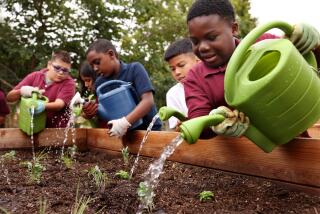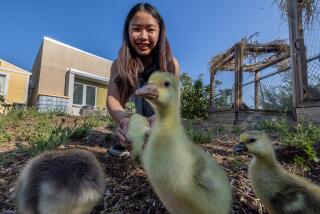WESTMINSTER : Teen-Agers Find Future in Farming
A teen-ager who is too young to drive carefully maneuvers a yellow tractor up and down the field, preparing the soil for a new crop of sweet corn. Nearby, other youths are busy inoculating cattle. And just a few yards away, another group, looking less than thrilled, cleans out sloppy pigpens.
For these teen-agers, agriculture students involved in the Future Farmers of America program at Westminster High School, this is a first taste of life on the farm.
Let others attend the pep rallies and catch the winning touchdowns. These students say there isnât any better place than the schoolâs five acres of land set aside for the raising of animals and crops.
âWeâre not a part of the jocks or the nerds,â said Heather Baca, 16, a student in the program. âAll of our spare time is spent out here, and thatâs the way we like it. We all work pretty hard, but itâs really a lot of fun too.â
Each year, about 60 students participate in the program, which is run through the schoolâs agriculture department. The program has been operated under the guidance of teacher Norm Makanishi since its inception 13 years ago.
Makanishi said he is often asked how students living in central Orange County could possibly benefit from such a program, since farmland in the area is about as easy to find as an uncongested freeway at rush hour.
âI donât expect these kids to become farmers,â Makanishi said. âItâs a common misconception that this program only prepares you for a career in farming. What people donât realize is that there are so many careers that are related to agriculture, like veterinary medicine, landscaping, meat cutting and the floral industry.â
Despite these career opportunities, the number of agricultural programs offered by school districts is on the wane. Westminster is the only school in the Huntington Beach Union High School District to have an agriculture department. In all of Orange County, only eight other schools have similar programs.
âItâs tougher to get students to enroll because academic requirements have become so much tougher,â Makanishi said. âAs it stands now, the students only have one elective, so agriculture is competing with so many other things. At our peak, we had about 180 students enrolled each year. I hope there are always agriculture programs, since not all students are college bound, and itâs important for them to have skills once they graduate.â
Many of the students go the extra mile by starting their own agricultural business, usually involves raising farm animals for profit. They either solicit a sponsor or finance the project themselves through low-interest loans.
Students such as Baca and Michelle Paul, 16, said raising these animals has been excellent preparation for when they go to college to study veterinary medicine.
âIt has taught us responsibility,â Paul said. âWeâve learned what kind of shots these animals need, what and how much to feed them and how to take care of them.â
Baca said she earned $1,020 raising six pigs this year and $1,000 from raising four steers. Paul has specialized in raising pigs and earns $100 for each one.
Both students said being a part of the Future Farmers of America has done more than teach them how to raise animals.
âI feel much more confident about myself than when I first came out here,â Paul said. âI feel like I know what Iâm talking about, and itâs carried over to other areas. Itâs helped me to build up my self-esteem.â
More to Read
Sign up for Essential California
The most important California stories and recommendations in your inbox every morning.
You may occasionally receive promotional content from the Los Angeles Times.










